We left St. Petersburg by bus on Friday, January 12, and 36 hours later found ourselves in Berlin. Two hours after that we were in the town of Greifswald, on the Baltic Sea but identified as Eastern Germany more than Northern. Nevertheless, as we proceeded north on the train we noticed more and more “grunkohl” (= a curly leafed, bright green kale common in Denmark) in people’s dachas (the Russian word for little gardens away from one’s home).
We were met at the train station by Mareen Protze, one of the members of the board of directors for Naturschutzjugend Deutschland (NAJU). NAJU is Germany’s largest youth environmental action organization, with over 80,000 members throughout the country. NAJU has many local and national environmental initiatives, including an internet game program where members score points based on different conservation/preservation activities, such as cleaning streams or building birdhouses.
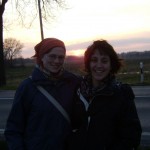
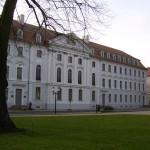
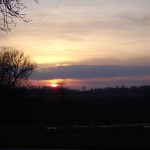
Photos L to R: Mareen & Sarah, place of study, northern germany at sunset.
But there is also an international scope: One of the things that NAJU does is coordinate International Exchanges over the summer, where participants can see what young people are doing on behalf of the environment in other parts of Europe. NAJU provides the organizational tools for any member of the organization to plan an exchange trip with a country and focus of their choice, and then makes the trip available to other people within the organization. Mareen has planned trips to Belarus and Poland in this way. These trips, and many others, focus on social exchange as well as environmental topics. For example, there is one trip this summer between Germany and Serbia that focuses on hip-hop culture in the two countries. As with many social and environmental initiatives, Germany seems to be leading the way with this one.
This international exchange aspect of NAJU was especially interesting to us — the international focus of our project in some way parallels what NAJU is doing, albeit on a much smaller scale.
We stayed with Mareen and her household from Sunday mid-day until the wee hours of Tuesday morning, which gave us a little less than two days to decompress from Russia and The Longest Bus Ride Ever. Our stay with Mareen and her household was really refreshing, as it was our first interaction with young people (early-to-mid 20’s) that are actively involved in improving the environment. We exchanged ideas and information on a much more personal level than we had been able to up to this point in the trip (especially compared to Russia!). They shared with us an amazing Austrian film, We Feed The World, about the current destructive state of food globalization. We gave them some seeds and advice for their first windy cold garden on the Baltic Sea, taking advantage of a different kind of globalization in order to help them come closer to their own food localization, and we left in a much nicer state than we had arrived.
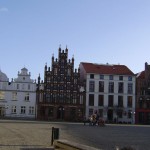
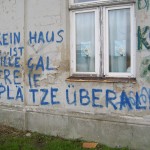
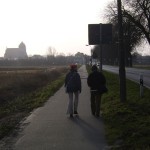
Photos L to R: Old town Greifswald, Inexpensive housing slated for destuction and the ensuing protest, Walking to town.
Next stop: Bingenheimer Saatgut AG, the largest Biodynamic seed company in the world (that doesn’t mean it’s all that huge, just big enough) .
Leave a Reply